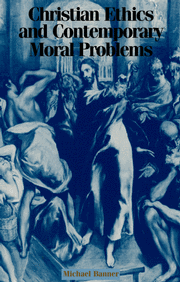Book contents
- Frontmatter
- Contents
- Preface
- Acknowledgements
- 1 Turning the world upside down – and some other tasks for dogmatic Christian ethics
- 2 Christian anthropology at the beginning and end of life
- 3 The practice of abortion: a critique
- 4 Economic devices and ethical pitfalls: quality of life, the distribution of resources and the needs of the elderly
- 5 Why and how (not) to value the environment
- 6 On not begging the questions about biotechnology
- 7 ‘Who are my mother and my brothers?’: Marx, Bonhoeffer and Benedict and the redemption of the family
- 8 Five churches in search of sexual ethics
- 9 Prolegomena to a dogmatic sexual ethic
- Bibliography
- Index
1 - Turning the world upside down – and some other tasks for dogmatic Christian ethics
Published online by Cambridge University Press: 21 May 2010
- Frontmatter
- Contents
- Preface
- Acknowledgements
- 1 Turning the world upside down – and some other tasks for dogmatic Christian ethics
- 2 Christian anthropology at the beginning and end of life
- 3 The practice of abortion: a critique
- 4 Economic devices and ethical pitfalls: quality of life, the distribution of resources and the needs of the elderly
- 5 Why and how (not) to value the environment
- 6 On not begging the questions about biotechnology
- 7 ‘Who are my mother and my brothers?’: Marx, Bonhoeffer and Benedict and the redemption of the family
- 8 Five churches in search of sexual ethics
- 9 Prolegomena to a dogmatic sexual ethic
- Bibliography
- Index
Summary
When Barth once likened the entrance of Christianity into human life to that of the Commendatore in his beloved Mozart's Don Giovanni, it is plain what motivated the comparison. What Barth wanted to stress with this imagery was a theme which lay close to his heart from the beginning of his revolutionary commentary The Epistle to the Romans to the final pages of the last volume of the monumental Church Dogmatics; it is that the Word of God, Jesus Christ, comes upon history, as it is humanly conceived, as an abrupt and unanticipated word, giving to this history an ending which could not be anticipated or expected, humanly speaking. No inference or induction, be it grounded in philosophy or psychology, in the natural sciences or in historical knowledge, could lead us to anticipate this conclusion to the story of human life. If it is anticipated, it is anticipated only prophetically – which is to say, that it is anticipated as ‘unanticipatable’ – as by the prophet Isaiah when he declares: ‘Thus saith the Lord … Remember ye not the former things, neither consider the things of old. Behold, I will do a new thing.’ (Isaiah 43: 16 and 18–19 and see 65: 17f.)
It was the newness of this new thing which Barth was seeking to represent when he likened the entrance of Christ into history to the entrance of the Commendatore, and yet it was a far from happy comparison; indeed we might put it more strongly and say that it was a singularly unhappy one, since the Commendatore, with his icy grip, drags the sinful and unrepentant Don Giovanni down to the flames of hell.
- Type
- Chapter
- Information
- Christian Ethics and Contemporary Moral Problems , pp. 1 - 46Publisher: Cambridge University PressPrint publication year: 1999



